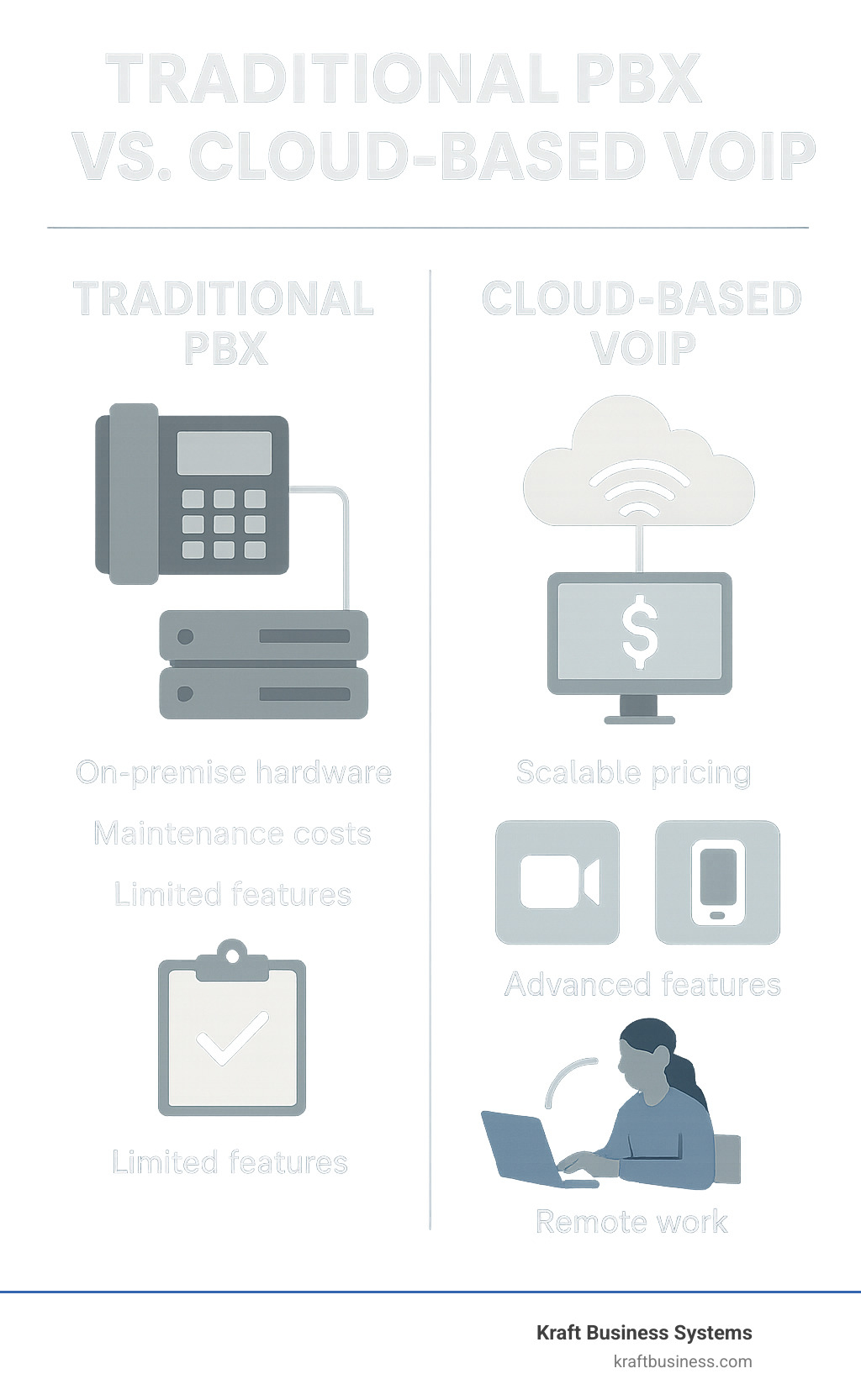Finding the right business voip system provider can transform how your company communicates. The market includes providers specializing in unified communications, AI-powered analytics, small business solutions, and international calling, ensuring a fit for every need.
Top Business VoIP Provider Categories:
- All-in-One Collaborators – Full unified communications with phone, video, and messaging
- AI-Powered Innovators – Real-time transcription, sentiment analysis, and call intelligence
- Small Business Specialists – Simple, affordable solutions with core calling features
- International Operators – Global calling plans and worldwide number availability
Traditional phone systems are outdated, expensive, and unreliable compared to modern VoIP solutions. Cloud-based phone systems offer significant advantages: cost savings up to 73% compared to traditional carriers, advanced features like auto-attendants and call recording, and the flexibility to work from anywhere.
Modern businesses need communication tools that support remote work, integrate with existing software, and scale with growth. VoIP systems deliver HD call quality, mobile apps, and seamless integration with CRM platforms—features that traditional landlines simply cannot match.
The shift to VoIP is about creating a cohesive work environment where teams collaborate effortlessly and customers feel connected, regardless of location.
The Core Advantages: What a VoIP System Brings to Your Business
When we help businesses in Grand Rapids, Ann Arbor, and Detroit upgrade their phone systems, the change is remarkable. A modern business voip system provider doesn’t just handle calls—it creates an entirely new way of working together.
Improved Communication and Collaboration
The real magic happens when you move to Unified Communications as a Service (UCaaS). This approach integrates voice, video, and messaging into a single platform. Your team can start a chat, escalate to a video call, and add colleagues to the conversation without juggling multiple apps.
This seamless integration transforms daily interactions. Team collaboration becomes effortless with presence indicators showing who’s available, instant screen sharing, and real-time communication. Whether your team is in our Michigan offices or working remotely, everyone stays connected.
The mobility factor is a huge advantage. Your desk phone, computer, and smartphone all become part of the same system, allowing employees to stay productive from anywhere. This streamlined workflow breaks down communication silos, improving response times and customer interactions.
Essential Features of Modern VoIP Phone Systems
A quality business voip system provider offers features that make traditional systems obsolete.
- Auto-Attendant (IVR): Acts as a virtual receptionist, professionally greeting and directing callers to the right person or department.
- Call Routing: Intelligently directs calls based on rules you set, such as ringing multiple people simultaneously or routing by skill set.
- Call Recording: Captures conversations for training, quality assurance, and compliance purposes.
- Voicemail-to-Email: Sends voicemails (as audio files and text transcriptions) directly to your inbox, eliminating phone tag.
- Mobile Apps: Turn any smartphone into a full business phone, allowing your team to make and receive calls from their business number anywhere.
- Scalability: Easily add or remove users in minutes without needing new hardware, ensuring the system grows with your business.
- Remote Work Support: Provides full phone functionality to employees working from home or on the road, requiring only an internet connection.
- CRM Integration: Connects with your CRM to display caller information automatically, giving your team instant context for every call.
For deeper insights into these transformative benefits, check out The Business Owner’s Guide to Voice Over Internet Protocol.
Cost Savings and Reliability
The financial impact is significant. Companies often save up to 73% on monthly phone bills compared to traditional carriers by eliminating hardware costs, maintenance fees, and per-minute charges. Most businesses see a return on investment within a year.
Modern VoIP systems also deliver 99.999% uptime through redundant cloud infrastructure. Call quality often surpasses landlines with crystal-clear HD voice, provided you have a stable internet connection. The combination of major cost savings and superior reliability makes VoIP a clear choice for forward-thinking businesses.
The statistics on VoIP cost savings confirm that businesses are switching because it makes financial sense while delivering better features.
How to Choose the Right Business VoIP System Provider
Choosing the right business voip system provider is simpler with a clear understanding of your needs. Our goal is to help you find a solution that fits your operations, whether you’re in Benzonia or Warren.
The selection process starts with an honest assessment of your business. Consider your team size and growth projections, as some providers are better for small teams while others excel at enterprise scale.
Analyze your call patterns. Do you handle high-volume inbound calls requiring advanced queues, or are you focused on outbound sales? Also, consider your remote versus in-office needs. A distributed workforce depends on robust mobile apps and softphones, while an office-centric team may prioritize desk phones.
Evaluating Your Needs to Find the Best business voip system provider
- Industry Requirements: Specialized industries have unique needs. For example, healthcare providers must ensure HIPAA compliance, while financial services have other regulatory concerns.
- Software Integrations: If your team relies on a CRM or helpdesk platform, seamless VoIP integration is crucial for productivity. Check for pre-built integrations and API capabilities.
- Call Management Features: Determine if you need a multi-level auto-attendant, ring groups for departments, call parking, or other specific call handling tools.
We monitor industry insights from sources like Gartner Peer Insights to provide current advice. For smaller operations, our VoIP Phone System for Small Office Guide offers targeted recommendations.
Understanding the True Cost of a business voip system provider
While VoIP delivers savings, understanding pricing models prevents surprises.
- Pricing Models: Most providers use per-user pricing, where you pay a monthly fee for each employee. Some may offer per-account pricing, which can be cost-effective for small teams.
- Setup Fees: Many providers advertise no setup fees, but complex configurations might incur charges. Always clarify this upfront.
- Hardware Costs: While you can use softphones and mobile apps, many businesses still prefer physical IP desk phones. Some providers include free or rented phones with plans, while others require you to purchase them.
- Contract Length: Annual contracts often provide discounts, but monthly agreements offer more flexibility. Be cautious of multi-year auto-renewing contracts.
- Add-On Costs: Ask about potential extra charges for toll-free numbers, international calling, call recording storage, or advanced analytics.
The cheapest option isn’t always the best. Investing in a reliable business voip system provider with excellent support saves more long-term by boosting productivity and avoiding downtime.
Comparing Top Business VoIP System Provider Archetypes
The market for business voip system provider solutions is diverse. To help you steer it, we’ve categorized providers into four archetypes based on their core strengths. This framework helps you understand the types of solutions available for your Company Phone Systems.
Understanding which archetype fits your business will save you research time and help you avoid choosing a system with too many or too few features.
| Archetype | Key Features | Best For | Typical Price Range | Support Level |
|---|---|---|---|---|
| All-in-One Collaborator | Unified communications, video conferencing, team messaging, file sharing | Growing teams, remote workforce, collaboration-focused businesses | Mid to high-tier pricing | Comprehensive support with dedicated account management |
| AI-Powered Innovator | Real-time transcription, sentiment analysis, call summaries, voice intelligence | Sales teams, customer service, data-driven organizations | Premium pricing for advanced features | Technical support with AI training resources |
| Small Business Specialist | Simple setup, core calling/texting, mobile-first design, user-friendly interface | Startups, small businesses, solo entrepreneurs | Budget-friendly with essential features | Self-service support with quick setup guides |
| International Operator | Unlimited international calling, local numbers worldwide, global network | International businesses, companies with overseas clients | Variable based on global calling needs | Multi-language support with global coverage |
The All-in-One Collaborator
This archetype acts as the Swiss Army knife of business communication, bringing phone calls, video conferences, and team messaging into one seamless platform. The focus is on a unified experience to reduce app-switching and boost productivity. These providers offer robust collaboration tools like presence indicators and screen sharing, along with enterprise-grade functionality and scalability, making them ideal for growing, remote, or hybrid teams that need to consolidate their communication stack.
The AI-Powered Innovator
These providers leverage artificial intelligence to improve sales and customer service. Their systems offer voice intelligence features like real-time transcription, call summaries, and sentiment analysis. By providing automated insights and handling administrative tasks, these platforms free up employees to focus on building relationships. This archetype is perfect for sales and support teams and any data-driven business looking to gain a competitive edge.
The Small Business Specialist
Focused on simplicity and affordability, this archetype is perfect for startups and small businesses that need professional communication without complexity. Key features include ease of use, a user-friendly interface, and a straightforward setup process. These solutions are cost-effective and often feature a mobile-first design, recognizing that small business owners are frequently on the go. They provide fundamental tools like a business number, calling, and texting.
The International Operator
For businesses with a global footprint, this archetype is essential. These providers specialize in making international communication cost-effective and reliable. Their flagship features include unlimited international calling to many countries and the ability to set up local numbers in multiple countries, establishing a local presence worldwide. They maintain a strong global network for high-quality calls, making them ideal for companies with international clients, offices, or partners.
Potential Challenges and How to Overcome Them
While a business voip system provider offers clear benefits, it’s wise to understand potential challenges and how to mitigate them.
Internet Dependency and Call Quality
Your VoIP system is only as reliable as your internet connection. Internet outages can halt communications, so we recommend a backup connection, like a primary fiber line with a cellular failover. Most VoIP solutions also include mobile apps that work over cellular data, providing a crucial fallback.
Bandwidth issues can cause choppy audio or dropped calls. This often stems from network congestion. The solution is Quality of Service (QoS), a network setting that prioritizes voice traffic over other data. This ensures your client calls remain clear even when your network is busy.
Security Concerns
Any internet-connected system faces potential security risks, but they are manageable. To prevent eavesdropping and hacking, choose a provider that offers call encryption and multi-factor authentication. Reputable VoIP providers often have more robust security than older phone systems.
Toll fraud, where unauthorized users make expensive international calls on your account, is another risk. Prevent this with strong passwords, restricting international calling where unnecessary, and monitoring call records for unusual activity. Our expertise in Secure Business Communications helps clients steer these issues.
Implementation Challenges
While easier than setting up traditional systems, VoIP implementation requires planning.
- Number Porting: Transferring your existing phone numbers can take a few weeks. Start the process early and provide accurate information to your new provider, who will manage the technical side to ensure no downtime.
- Staff Training: Your team will need time to learn the new system. Choose a provider with an intuitive interface and good training resources. We can provide on-site training to ensure a smooth transition for your team.
- Integration: Connecting VoIP with your CRM or other software may require technical help. Work with your provider or an IT partner like us to ensure proper configuration and testing.
With proper planning and support, these challenges are easily overcome, leading to a smooth and transformative upgrade.
Conclusion: Making the Right Call for Your Business’s Future
The journey to finding the perfect business voip system provider is about setting your company up for long-term success. Modern VoIP systems do more than handle calls—they create a foundation for seamless communication, improved collaboration, and superior customer service.
The financial benefits are compelling, with cost savings up to 73% over traditional systems. But the true value lies in giving your team the flexibility to work from anywhere, the advanced features to boost productivity, and the scalability to grow with your ambitions.
There is no single “best” provider; the right choice depends on your unique needs. A growing agency in Ann Arbor might need an all-in-one collaborator, while a small firm in Traverse City may prefer a simple specialist. The key is to understand your team size, call patterns, budget, and growth plans.
At Kraft Business Systems, we’ve guided countless Michigan businesses through this transition. We understand that switching systems can feel daunting, which is why we take a consultative approach. We assess your current setup, understand your goals, and help you steer the selection process with confidence.
Our role extends to managing the entire implementation process—from number porting to staff training—to ensure a smooth transition without downtime. The future of business communication is here and more accessible than ever. We’re here to help you make the right call for your business’s future.
Can I keep my existing business phone number?
Yes, absolutely. Transferring your number is a standard process called "number porting." Reputable providers will handle the transfer of your existing local, toll-free, or vanity numbers. You'll authorize the switch, and your new provider will coordinate with your old one to ensure a seamless transition with no downtime. This is a key part of moving your IP Phone System without disrupting business.
What kind of hardware do I need for a VoIP system?
VoIP offers flexibility, so you may need less new hardware than you think. Your options include:
• IP Desk Phones: These connect to your internet network and offer a familiar, traditional office phone experience with HD voice quality.
• Softphones: This is software for your computer that functions as a phone when used with a headset. It's a cost-effective option ideal for remote workers.
• Mobile Apps: These apps turn any smartphone into a business phone extension, allowing employees to use their business number on the go.
• Analog Telephone Adapters (ATAs): These devices allow you to connect existing analog equipment, like a fax machine, to your new VoIP system.
How is a business VoIP system different from a personal service like Google Voice?
While they use similar technology, they are built for different purposes. A business VoIP system is a professional tool with features that personal services lack, including: • Advanced Call Management: Features like auto-attendants (IVR), call queues to handle high volume, and ring groups to ensure calls are answered.
• Analytics and Reporting: Detailed data on call volumes, peak times, and employee performance to help you make informed business decisions.
• Software Integration: Seamless connection with business tools like your CRM or helpdesk.
• Guaranteed Reliability: Service Level Agreements (SLAs) that guarantee high uptime (often 99.999%).
• Professional Support: Dedicated customer support to resolve issues quickly.
• Improved Security: Enterprise-grade security features like call encryption and fraud prevention.









